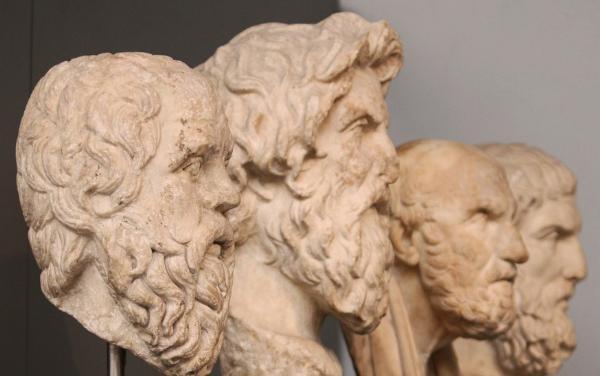What do we need to do in order to live a good life, and why should we want to do this? John Moffatt SJ looks at different approaches to developing an ethical framework, and examines the relationship of religion to various ethical traditions.
The secularist-religious debate that has been raging – or perhaps smouldering – over the last few years, in Britain particularly, has produced some interesting fruits. One of these fruits has been the resuscitation of an idea, once unfashionable on this island, that ethics – how one lives one’s life – is a central area of concern for philosophy, rather than the marginal concern of nice people who are unable to cope with the machismo of modal logic or philosophy of mind. The spur has been the crude ethical argument of some defenders of religion that without religion we would have no morals and would not know what we ought to do. Although the crude position is easy enough to refute (one good atheist suffices) any given religious position does seem to provide a sort of answer to two awkward questions for philosophy and for life: how do we know what we ought to do and why should we choose to do what we ought to do? There is therefore a pressure on those who would dispense with a God-centred world-view to come up with an account of ethics that provides an appropriate non-religious answer to those questions. If we in Britain are to have a society which is free of religion, on what shared principles is our common life to be founded?
A.C. Grayling in ‘What is Good?’ develops a line of thought which reads the rich ethical tradition of antiquity through the lens of the enlightenment concern for the autonomy of the rational subject. He identifies a common humanist spirit, reaching back to ancient Athens. He suggests that humanists imbued with that spirit would most likely identify the following as the elements of the good life: ‘individual liberty, the pursuit of knowledge, the cultivation of pleasures that do not harm others, the satisfactions of art, personal relationships, and a sense of belonging to the human community.’ Central are the concepts of freedom and autonomy and the fundamental idea ‘that people possess reason and that by using it they can choose lives worth living for themselves and respectful of their fellows.’ Science is a glorious human achievement and the true servant of progress. One of its liberating functions, applied to questions of human nature and society, is to make possible ‘a better and finer understanding of what conduces to the human good... it is insight into human needs and human nature which alone makes possible a grasp of what would promote human flourishing.’ In context, this highlighting of human autonomy and a sophisticated understanding of human nature contrasts with a religious understanding in which our life goals are set by someone else (a caste of priests) and the good life consists in obedience to their rules (heteronomy).
This, Grayling argues, gives us the framework for a common and democratic ethic: the more we know about the things which enhance the quality of a human life, the better placed we will be, individually and collectively, to take decisions that will make those things possible for ourselves and each other. We begin to have an answer for the question, ‘how do we know what to do, how to behave?’ – namely, whatever makes our lives worth living and is respectful of our fellows.
This vision of human society is intuitively attractive for anyone whose instincts have been shaped by western culture. Like all principled visions it needs a lot of working out in the detail and like all visions it does not explain exactly why, when allowances have been made for cultural conditioning, it should be compelling. It works as long as everyone de facto agrees on the core values. Grayling, quoting Tzvetan Todorov, identifies three such core values of humanism as ‘recognition of the equal dignity of everyone, altruism (the elevation of the particular human being other than me as the ultimate goal of my action) and the preference for freedom of action.’ He recognises that these will not always be mutually consistent. The question remains, why should we accept just these as irreducible values? What makes them worth having as action-guiding principles?
The answer given by Grayling seems to be similar to that provided by David Hume and J.S. Mill, which is that we just do, as a matter of human fact, value these things. This may be uncontroversial with regard to the preference for freedom, but is a little less obvious in the case of altruism and the recognition of equal dignity. What precise interplay, for instance, is supposed to exist between reason, affectivity and nature? Perhaps we have a universal desire to be good towards other people (in general) which we articulate in our principles and then realise in our practical decisions with individuals. Or perhaps we always feel a sympathy for any individual we meet and naturally want to help that person in any reasonable way. But that ‘always’ seems counter-intuitive. It may be that I am a deeply unpleasant person, but I have to confess that I do not always instinctively want to help the person in need in front of me. I sometimes have to force myself to act on principle. Then again, a vague philanthropic desire to be nice to all people, which is affectively distinct from a desire to be nice to a particular person, seems no more a reason for being nice to someone I don’t like than not liking them is a reason for not being nice to them.
However, there does seem to be some evidence from human anthropology that we are inclined to be nice to each other (I recently heard a socio-biologist quote evidence from studies of children’s behaviour to one another across cultures) and an extreme inference from this thesis seems almost to be that we do not need ethical education. We have our ethical autonomy as a fact of nature. But you do not have to look too far before you find indications that we are also inclined to be quite unpleasant to one another – the primary school playground also provides examples of this. And if our primal desires lead us in different directions, how are we rationally to judge which of them should be normative, which of them hasvalue in our version of the good life? It does not seem accidental that Aristotle, close to the roots of the humanist tradition, describes the ethical project as ‘learning to desire those things we ought to desire and hate those things we ought to hate’. Living together in a community entails learning to train our affectivity, which implies an ethical education. This in turn suggests that ethical goals approved by a culture or society be given priority over individual affectivity. It suggests that there is an element to ethical progress which at some point means listening to and learning from other people, an element of heteronomy on the way to mature, rational, ethical autonomy. We have to learn to live together.
But on what basis do we teach and learn? Force and fear is one option (resisted by modern humanists). Reason is another (approved). But we can see that, as things stand, problems arise when we encounter an individual whose affectivity very definitely does not lead them in the direction of universal respect for the other. What reasonable grounds could a humanist give to persuade such an individual to change and adopt the core values of humanism? Or put it the other way round, once someone has recognised that people only value these things on the basis of an inherited affective characteristic, what is to stop them choosing to defy nature – or transcend nature – as free subjects? What arguments could persuade an Übermensch or a Mr. Kurz to accept the parameters of a conventional morality, even of a convention of humanists?
This critical question is handled in a rather different way by Plato, who lived through an ancient equivalent of a modern/post-modern revolution and whose life’s work consisted in producing an answer to the challenge posed by that revolution. One of the avenues he explores is ethical language itself. In his dialogue Gorgias, Socrates, as the central character, argues with another character, Kallikles, as to whether pleasure is the only worthwhile goal in human life. Kallikles is fenced into a corner when asked to label as ‘good’ a particular sort of pleasure which he (Kallikles) thinks is degraded. The point is not so much about discovering a moral absolute as about establishing that ethical language is logically distinct from the language of likes and dislikes – it has something of a life of its own, a certain irreducibility. This irreducible feature of ethical language is shared by all who use it, irrespective of how much they disagree on particular issues of ethical content. The language of ethical value, its special logic and the affective constraints that go with it are a part of the structure of human communities.
The second strand of argument that Plato follows is developed most fully in the Republic. Here the protagonist, Socrates, is challenged to explain why one should want to be just. Having established the point that ‘just’ cannot be reduced (this time) to ‘whatever the most powerful person wants’, Socrates is then faced with the practical problem of the man with the invisibility ring, who can actually do whatever he wants to whoever he wants. By this stage all the participants are in broad agreement about the sort of thing they mean by ‘justice’ in the context of a common life, but the question remains, why be just when you don’t have to, and when it brings no obvious benefits? The short version of the (long) answer is that justice – alongside the other virtues of courage, self-control and wisdom – is good for the soul. Just as the human body can be destroyed and degraded by indulgence in unhealthy living-habits, so too with the human soul. It is (paradoxically) better to be the victim of injustice than its perpetrator. This ultimate good order of the human soul is brought about as the soul embarks on a journey of enlightenment towards a realm of absolute, though undefined, value – the world of the Forms. The irreducible core of human ethical language leads the enquiring mind towards a liberating encounter with the reality of goodness.
Strangely (from the perspective of revealed religion) this ultimate source of value is not identified with a god or gods. Though Plato’s gods are all ethically admirable, they are not the authors of ethical reality. Jewish and Christian writers would, of course, incorporate Plato’s mystical relationship to ethics into their exegesis and theology. But for the purposes of this discussion we can note that, like modern, non-theistic, ethical theorists, Plato answers the question ‘why?’ by reference to human anthropology. Like (most) modern theorists he affirms the irreducibility of ethical language, but whereas Grayling and others root that irreducibility in the nature of human affections, Plato roots it in the nature of human cognition – though not without an affective dimension. The modern picture tells the story of an ethic that emerges from within the naturally well-disposed self. Plato’s picture tells the story of an ethic which emerges through a vital and questioning cognitive relationship between an individual subject and a transcendent reality somehow accessible through the language of human society.
Bringing non-divine transcendent realities into the question raises a huge number of difficulties for modern people with a distaste for “metaphysics”. But it does make sense of ethics as ultimately a rational project. There is something to be discovered. And more significantly it allows for the possibility of ethical prophets and ethical progress. Socrates himself is presented by Plato as a proto-martyr for truth, the just victim of collective injustice, whose example is an inspiration to the philosophers of the next century. We too want to say that ethical systems can be better or worse, but without some criterion, how can one system consider itself justified in judging another? How can two people have a serious ethical argument? Any given set of ethical assumptions and conclusions (even those of modern humanism) has a certain provisionality. But ethical concern itself can seem pointless unless there is at least a notional reality, however elusive, which lies beyond and gives it (and us) meaning.
So this recent challenge to a naïve view about the relation between ethics and religion is to be welcomed for a number of reasons. Not least is that philosophy in England is returning to its ancient roots and beginning to provide a narrative for a way of living well, in a recognisably ethical sense of the adverb. There is a return to the ancient sense that ethical value is (pace Hume) in some sense a fact of human reality. But a second reason is that we Christians are once more spurred to look beyond a simplistic account of our ethical beliefs. We are invited to reconnect with the subtlety and complexity of our own tradition, in its interplay between the tradition of the Law and the Prophets and the different Hellenistic philosophical schools. We can begin to recognize once more that the best of the religious ethical traditions and the best of non-religious ethics, even when they disagree about features of the ethical terrain, share a common horizon, against which it makes sense to say that the good life is worth living. And we can begin to talk again.
John Moffatt SJ is Catholic Chaplain to the University of Oxford. He is the author of Beyond the Catechism: Intellectual Exercises for Questioning Catholics (Lulu, 2006).
![]() Oxford University Catholic Chaplaincy
Oxford University Catholic Chaplaincy
![]() Beyond the Catechism: Intellectual Exercises for Questioning Catholics
Beyond the Catechism: Intellectual Exercises for Questioning Catholics






